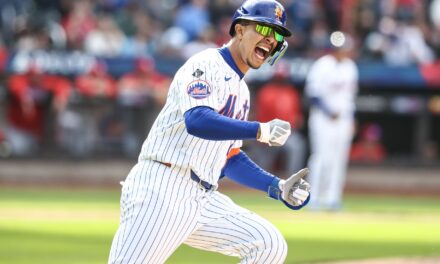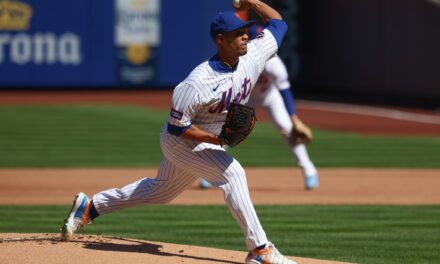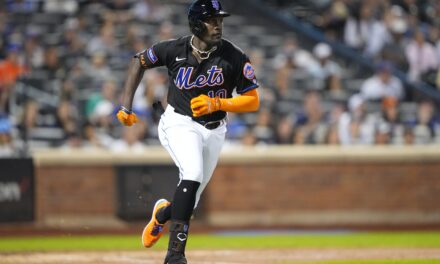
So far, this has been a compelling playoffs with plenty of excitement and widespread interest. Major League Baseball is thrilled, and hopefully this trend will continue in the League Championship Series and World Series.
That’s what baseball should be about.
Hopefully, the Mets are taking notes. Four of the teams in the playoffs – Oakland, Baltimore, Cincinnati and Washington – have payrolls less than the $100 million the Mets shelled out this year for the joy of finishing 14 games below .500.
Here’s what the playoff teams have that the Mets lack:
- Pitching: Both starting and bullpen are vital to winning. Always has been, always will be. That’s why I get frustrated when I hear complaints about the Mets’ lack of power. Home runs are the great eraser and the Yankees proved that last night. But, they were in position to win because of pitching. Three games against the Orioles and their starters reached the eighth inning each time. Unheard of. All of the teams have solid pitching and a good bullpen. As I wrote earlier today, Baltimore’s Darren O’Day is making $1.35 million this year, so it can be done inexpensively. However, that requires an aggressive front office and superior scouting, two areas where the Mets need improvement.
- Strong Minor League System: It would be foolish to say each of these teams were built solely on their farm system. Detroit and the Yankees all acquired significant talent from the outside, but there is core home grown talent from all. Just look at Matt Wieters, Joey Votto, Matt Cain and Bryce Harper. I would have mentioned Stephen Strasburg, but the Nationals pulled him from the playoffs. It could bite them in the butt, and what if the Nationals never get back here? It is possible. That is why it was encouraging this summer when several times the Mets fielded a full home grown-lineup and why I am opposed conceptually to trading Ike Davis. The Mets have a home product who hit 32 homers this year. Those don’t come along often, and rarely for the Mets. Davis is a start, along with Jon Niese, Matt Harvey and Ruben Tejada, not to mention David Wright. Bolstering the farm system and improving the scouting are essential for long-term growth. Free-agent signings should be to complement what’s already there.
- Strong Catching: Wieters is clearly the catcher with the most upside in the group. Regardless of how Russell Martin has played in October, the idea of pursuing him is outlandish and it was a ridiculous idea in the first place. Obviously, a slow news day. Martin is too old and too expensive for a rebuilding team, and let’s not kid ourselves, that defines the Mets. I was initially optimistic about Josh Thole, but those feelings have waned. He’s not hit for average or power and his defense has regressed. And, let’s not blame R.A. Dickey’s knuckleball for it. Catching is an issue, but I don’t believe it is as high on the Mets’ priority list as adding outfielders and relievers.
- Timely Hitting: It doesn’t get more timely than what Raul Ibanez did last night. The Mets were clutch in the first half, but their hitting with runners in scoring position disappeared in the second half. It all fell on Wright after the All-Star break and he couldn’t handle the strain. Each of these teams has an offensive core, hitters that concern an opposing manager. After Wright, and at times Davis, who is frightening in the Mets’ lineup. Scott Hairston had a good season coming off the bench, as Ibanez did, but after hitting 20 homers for the first time he might be too expensive to bring back.
- Home Field Advantage: So far, it hasn’t helped San Francisco and Cincinnati, but nonetheless each of the teams in the postseason had a winning record at home. The Mets can’t ever be a serious contender until they learn to use Citi Field as an advantage. I understand the Catch-22, that part of that advantage is having people in the stands. The Mets need to improve the first four before this will take root. When Citi Field opened the Mets were vocal in saying they would build around pitching and defense, so naturally the first thing they did was sign Jason Bay. That’s the final lesson I hope the Mets learn …
- Have A Plan: Where are the Mets headed? If they don’t bring back Wright and Dickey, then it is back to square one. The team is operating as if they have no money and that’s a discouraging sign. GM Sandy Alderson said the team had the resources to add at the trade deadline, but waited until the team had fallen out of contention before deciding it was too late. On one hand, the Mets are singing the praises of their young pitching, but on the other it is exploring trading Davis, and could not bring back Wright or Dickey. What gives?














